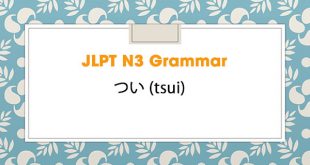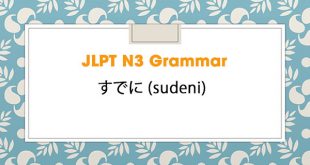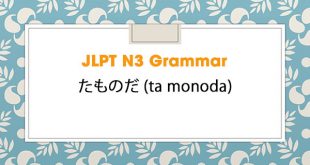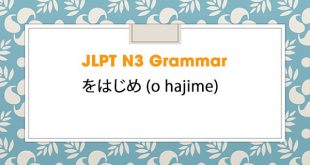つい (tsui) Meaning: Carelessly; by mistake; by accident Explain: Using expressive meanings means that will not be able to do it but you miss it because you cannot control yourself. Often used with the phrase 「Vてしまう」 Example sentences: 1, 今日は試験があったつい遅くなってしまった。 Kyō wa shiken ga atta tsui osoku natte shimatta. There …
Read More »Grammar
JLPT N3 Grammar: すでに~(~既に)sudeni (sudeni)
すでに~(~既に)sudeni (sudeni) Meaning: already ~ Explain: Shows actions taken in the past Example sentences: 1, その飛行機はすでに出発してしまった。 Sono hikōki wa sudeni shuppatsu shite shimatta. That plane has departed already 2, そのへ着いたときには,レストランはすでに閉まった Sono e tsuita tokiniha, resutoran wa sudeni shimatta When we arrived, the restaurant was already closed 3, あの本はすでに呼んでしまった。 Ano hon …
Read More »JLPT N3 Grammar: さらに~(~更に) sarani (sarani)
さらに~(~更に) sarani ~(~sarani) Meaning: furthermore; again; more and more How to use the: さらに + phrase Explain: The expression expressed more progressively than the present. Expression of words in writing, in addition to using polite speech. When used together with quantity, it means more. Example sentences: 1, 途中の小屋まで5時間、それから頂上まではさらに2時間かかった。 Tochū no …
Read More »JLPT N3 Grammar: どうやら (dou yara)
どうやら (dou yara) Meaning: it seems like; it appears that; seemingly How to use the: どうやら + phrase Explain: Usually used with the form 「どうやら+らいい/ようだ」 Show a situation that is not very well known but looking at it from the state of things looks like or is the last thing …
Read More »JLPT N3 Grammar: ふり~(~振り)furi ~(~ furi)
ふり~(~振り)furi ~(~ furi) Meaning: pretend to be Example sentences: 1, 元気そうなふりをしているが彼は病気だ Genki-sōna furi o shite iruga kare wa byōkida He pretended to be fine but was actually sick 2, 昨日彼は私に見えないふりです。 Kinō kare wa watashi ni mienai furidesu. Yesterday he pretended not to see me 3, 日本人のふりをする。 Nihonjin no furi o …
Read More »JLPT N3 Grammar: まさか (masaka)
まさか (masaka) Meaning: there’s no way, by no means, that’s impossible, you must be joking Explain: Describing the rejection mood, objecting to such an event could not actually happen, there was absolutely no such thing. Usually, the sentence comes with 「ないだろう」、「まい」、「はずがない」、「わけがない」, etc. Showing the negative meaning Example sentences: 1, 彼には何度も念を押しておいたから、まさか遅れることはないだろう。 …
Read More »JLPT N3 Grammar: たものだ (ta monoda)
たものだ (ta monoda) Meaning: Often (remember, reminisce) How to use the: Vた+ものだ Explain: Used in retrospect to include moods and feelings about things that have been carried out in the past Example sentences: 1, そのころは週末になると書店にいりびだったものでした。 Sono koro wa shūmatsu ni naru to shoten ni iri bida tta monodeshita. At that …
Read More »JLPT N3 Grammar: わざわざ (wazawaza)
わざわざ (wazawaza) Meaning: take the trouble to, taking the time to do Explain: Adverbs are often used to indicate the effort of doing something and expressing thanks, gratitude Example sentences: 1, 田中さんは私の忘れ物をわざわざ家まで届けてくれた。 Tanaka-san wa watashi no wasuremono o wazawaza ie made todokete kureta. Mr. Tanaka took efforts to bring something …
Read More »JLPT N3 Grammar: さえ ~ ば (sae ~ ba)
さえ ~ ば (sae ~ ba) Meaning: if only ~ then; as long as; the only thing ~ need is; even How to use the: Noun + さえ + Verb-ばform Verb-ますstem + さえすれば Verb-てform + さえいれば Explain: Use this sentence pattern to emphasize the previous word with just, even, even …
Read More »JLPT N3 Grammar: をはじめ (o hajime)
をはじめ (o hajime) Meaning: starting with; First is ~; first of all ~ How to use the: Noun + をはじめ/をはじめとする Explain: Spokenness provides a typical way to present the content of the incident Example sentences: 1, 日本の伝統芸能としては、歌舞伎をはじめ、能、茶の湯、生け花なでおが挙げられる Nihon no dentō geinō to shite wa, kabuki o hajime,-nō, chanoyu, ikebana nade …
Read More » Learn Japanese Free Learn Japanese Free
Learn Japanese Free Learn Japanese Free










